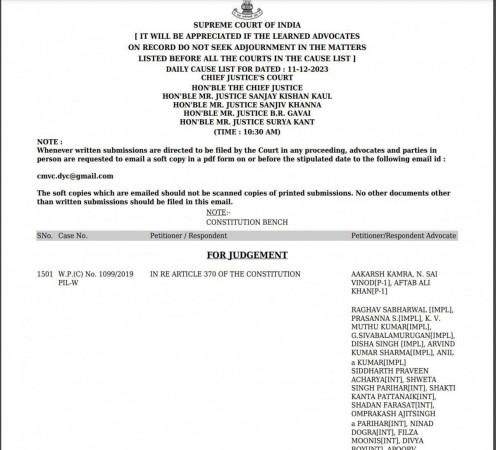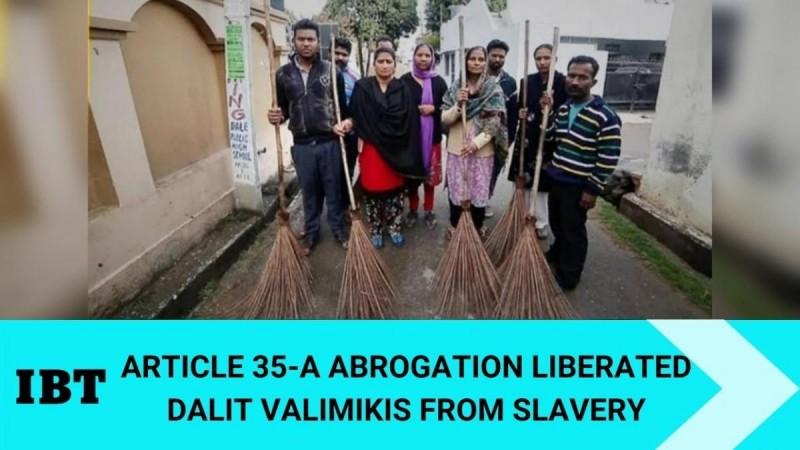
Three months after reserving its verdict on the much-publicized case, the Supreme Court will pronounce its judgment on the petitions challenging the abrogation of articles 370 and 35-A
A five-judge Constitution Bench comprising Chief Justice of India (CJI) DY Chandrachud, and Justices Sanjay Kishan Kaul, Sanjiv Khanna, BR Gavai, and Surya Kant will deliver the verdict on a batch of pleas challenging the abrogation of Article 370 of the Constitution.
Many petitions challenging the abrogation of Article 370 and Article 35-A and the Jammu and Kashmir Reorganisation Act, 2019 were referred to the Constitution bench in 2019.

Eminent lawyers argued during the course of the hearing which lasted for 16 days.
There are 23 petitions filed before the Top Court challenging the Union government's August 5, 2019 decision to scrap special status under Article 370 to J&K and bifurcate the state into two UTs - J&K and Ladakh.
The lawyers from both sides debated on the issues including the constitutional validity of the decision of the Union Government to repeal Article 370 and Article 370. They also debated on the validity of the Jammu and Kashmir Reorganisation Act, which bifurcated the erstwhile state of Jammu and Kashmir into two Union Territories.

On September 5, the Supreme Court reserved its verdict
A five-judge bench of the Supreme Court on September 5 reserved its verdict on petitions challenging the abrogation of Article 370. The Constitution Bench had started day-to-day hearing of the pleas on August 2.
The Supreme Court bench headed by Chief Justice DY Chandrachud heard the rejoinder arguments of senior advocates Kapil Sibal, Gopal Subramanium, Rajeev Dhavan, Zaffar Shah, Dushyant Dave and others on the concluding day of the hearing, which went on for 16 days.
The Supreme Court is set to announce its verdict on Monday regarding the abrogation of Articles 370 and 35A, which granted special status to Jammu and Kashmir.
- On August 5, 2019, the central government revoked Articles 370 and 35A.
- The petitioners include leaders from major political parties in Jammu and Kashmir, such as the National Conference and the PDP.
- Petitioners also challenged the bifurcation of the erstwhile state of Jammu and Kashmir into two Union Territories, Jammu and Kashmir, and Ladakh, under the Jammu and Kashmir Reorganization Act.
- Chief Justice D.Y. Chandrachud-led Constitution Bench, after a 16-day-long hearing, reserved its decision on September 5.
National Conference Lok Sabha member from Baramulla Mohammad Akbar Lone, who is also one of the petitioners, had told the Supreme Court that there should not be an "emotive majoritarian interpretation" of the Indian Constitution by those supporting abrogation of Article 370, as Jammu and Kashmir was neither completely linked to India nor asked to sign a merger agreement like other princely states.

Main petitioner Shah Faesal already withdrew his plea
IAS officer Shah Faesal, who was one of the main petitioners against the abrogation of Article 370 in Jammu and Kashmir, had withdrawn his pleas from the Supreme Court.
Shah Faesal, the first Kashmiri to top the civil services (UPSC) exam in 2009, had resigned from his post in 2019 after the central government's August 5 decision to end Jammu and Kahmir's special status.
However, in April 2022, the government accepted Faesal's application to withdraw his resignation and reinstated him in service.
In his recent Twitter post, Shah Faesal said that Article 370 was now a "thing of the past".












